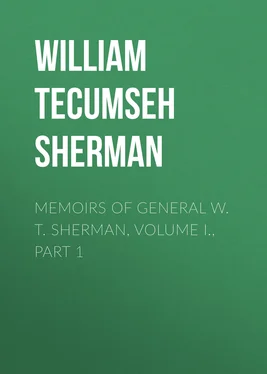William Tecumseh Sherman - Memoirs of General W. T. Sherman, Volume I., Part 1
Здесь есть возможность читать онлайн «William Tecumseh Sherman - Memoirs of General W. T. Sherman, Volume I., Part 1» — ознакомительный отрывок электронной книги совершенно бесплатно, а после прочтения отрывка купить полную версию. В некоторых случаях можно слушать аудио, скачать через торрент в формате fb2 и присутствует краткое содержание. Жанр: Биографии и Мемуары, История, foreign_edu, foreign_antique, foreign_prose, на английском языке. Описание произведения, (предисловие) а так же отзывы посетителей доступны на портале библиотеки ЛибКат.
- Название:Memoirs of General W. T. Sherman, Volume I., Part 1
- Автор:
- Жанр:
- Год:неизвестен
- ISBN:нет данных
- Рейтинг книги:4 / 5. Голосов: 1
-
Избранное:Добавить в избранное
- Отзывы:
-
Ваша оценка:
- 80
- 1
- 2
- 3
- 4
- 5
Memoirs of General W. T. Sherman, Volume I., Part 1: краткое содержание, описание и аннотация
Предлагаем к чтению аннотацию, описание, краткое содержание или предисловие (зависит от того, что написал сам автор книги «Memoirs of General W. T. Sherman, Volume I., Part 1»). Если вы не нашли необходимую информацию о книге — напишите в комментариях, мы постараемся отыскать её.
Memoirs of General W. T. Sherman, Volume I., Part 1 — читать онлайн ознакомительный отрывок
Ниже представлен текст книги, разбитый по страницам. Система сохранения места последней прочитанной страницы, позволяет с удобством читать онлайн бесплатно книгу «Memoirs of General W. T. Sherman, Volume I., Part 1», без необходимости каждый раз заново искать на чём Вы остановились. Поставьте закладку, и сможете в любой момент перейти на страницу, на которой закончили чтение.
Интервал:
Закладка:
The company had been filled up to one hundred privates, twelve non-commissioned officers, and one ordnance sergeant (Layton), making one hundred and thirteen enlisted men and five officers. Dr. James L. Ord had been employed as acting assistant surgeon to accompany the expedition, and Lieutenant H. W. Halleck, of the engineers, was also to go along. The United States store-ship Lexington was then preparing at the Navy-Yard, Brooklyn, to carry us around Cape Horn to California. She was receiving on board the necessary stores for the long voyage, and for service after our arrival there. Lieutenant-Commander Theodorus Bailey was in command of the vessel, Lieutenant William H. Macomb executive officer, and Passed-Midshipmen Muse, Spotts, and J. W. A. Nicholson, were the watch-officers; Wilson purser, and Abernethy surgeon. The latter was caterer of the mess, and we all made an advance of cash for him to lay in the necessary mess-stores. To enable us to prepare for so long a voyage and for an indefinite sojourn in that far-off country, the War Department had authorized us to draw six months' pay in advance, which sum of money we invested in surplus clothing and such other things as seemed to us necessary. At last the ship was ready, and was towed down abreast of Fort Columbus, where we were conveyed on board, and on the 14th of July, 1846, we were towed to sea by a steam-tug, and cast off: Colonel R. B. Mason, still superintendent of the general recruiting service, accompanied us down the bay and out to sea, returning with the tug. A few other friends were of the party, but at last they left us, and we were alone upon the sea, and the sailors were busy with the sails and ropes. The Lexington was an old ship, changed from a sloop-of-war to a store-ship, with an after-cabin, a "ward-room," and "between-decks." In the cabin were Captains Bailey and Tompkins, with whom messed the purser, Wilson. In the ward-room were all the other officers, two in each state-room; and Minor, being an extra lieutenant, had to sleep in a hammock slung in the ward-room. Ord and I roomed together; Halleck and Loeser and the others were scattered about. The men were arranged in bunks "between-decks," one set along the sides of the ship, and another, double tier, amidships. The crew were slung in hammocks well forward. Of these there were about fifty. We at once subdivided the company into four squads, under the four lieutenants of the company, and arranged with the naval officers that our men should serve on deck by squads, after the manner of their watches; that the sailors should do all the work aloft, and the soldiers on deck.
On fair days we drilled our men at the manual, and generally kept them employed as much as possible, giving great attention to the police and cleanliness of their dress and bunks; and so successful were we in this, that, though the voyage lasted nearly two hundred days, every man was able to leave the ship and march up the hill to the fort at Monterey, California, carrying his own knapsack and equipments.
The voyage from New York to Rio Janeiro was without accident or any thing to vary the usual monotony. We soon settled down to the humdrum of a long voyage, reading some, not much; playing games, but never gambling; and chiefly engaged in eating our meals regularly. In crossing the equator we had the usual visit of Neptune and his wife, who, with a large razor and a bucket of soapsuds, came over the sides and shaved some of the greenhorns; but naval etiquette exempted the officers, and Neptune was not permitted to come aft of the mizzen-mast. At last, after sixty days of absolute monotony, the island of Raza, off Rio Janeiro, was descried, and we slowly entered the harbor, passing a fort on our right hand, from which came a hail, in the Portuguese language, from a huge speaking-trumpet, and our officer of the deck answered back in gibberish, according to a well-understood custom of the place. Sugar-loaf Mountain, on the south of the entrance, is very remarkable and well named; is almost conical, with a slight lean. The man-of-war anchorage is about five miles inside the heads, directly in front of the city of Rio Janeiro. Words will not describe the beauty of this perfect harbor, nor the delightful feeling after a long voyage of its fragrant airs, and the entire contrast between all things there and what we had left in New York.
We found the United Staten frigate Columbia anchored there, and after the Lexington was properly moored, nearly all the officers went on shore for sight-seeing and enjoyment. We landed at a wharf opposite which was a famous French restaurant, Farroux, and after ordering supper we all proceeded to the Rua da Ouvador, where most of the shops were, especially those for making feather flowers, as much to see the pretty girls as the flowers which they so skillfully made; thence we went to the theatre, where, besides some opera, we witnessed the audience and saw the Emperor Dom Pedro, and his Empress, the daughter of the King of Sicily. After the theatre, we went back to the restaurant, where we had an excellent supper, with fruits of every variety and excellence, such as we had never seen before, or even knew the names of. Supper being over, we called for the bill, and it was rendered in French, with Brazilian currency. It footed up some twenty-six thousand reis. The figures alarmed us, so we all put on the waiters' plate various coins in gold, which he took to the counter and returned the change, making the total about sixteen dollars. The millreis is about a dollar, but being a paper-money was at a discount, so as only to be worth about fifty-six cents in coin.
The Lexington remained in Rio about a week, during which we visited the Palace, a few miles in the country, also the Botanic Gardens, a place of infinite interest, with its specimens of tropical fruits, spices; etc., etc., and indeed every place of note. The thing I best recall is a visit Halleck and I made to the Corcovado, a high mountain whence the water is conveyed for the supply of the city. We started to take a walk, and passed along the aqueduct, which approaches the city by a aeries of arches; thence up the point of the hill to a place known as the Madre, or fountain, to which all the water that drips from the leaves is conducted by tile gutters, and is carried to the city by an open stone aqueduct.
Here we found Mr. Henry A. Wise, of Virginia, the United States minister to Brazil, and a Dr. Garnett, United States Navy, his intended son-in-law. We had a very interesting conversation, in which Mr. Wise enlarged on the fact that Rio was supplied from the "dews of heaven," for in the dry season the water comes from the mists and fogs which hang around the Corcovado, drips from the leaves of the trees, and is conducted to the Madre fountain by miles of tile gutters. Halleck and I continued our ascent of the mountain, catching from points of the way magnificent views of the scenery round about Rio Janeiro. We reached near the summit what was called the emperor's coffee-plantation, where we saw coffee-berries in their various stages, and the scaffolds on which the berries were dried before being cleaned. The coffee-tree reminded me of the red haw-tree of Ohio, and the berries were somewhat like those of the same tree, two grains of coffee being inclosed in one berry. These were dried and cleaned of the husk by hand or by machinery. A short, steep ascent from this place carried us to the summit, from which is beheld one of the most picturesque views on earth. The Organ Mountains to the west and north, the ocean to the east, the city of Rio with its red-tiled houses at our feet, and the entire harbor like a map spread out, with innumerable bright valleys, make up a landscape that cannot be described by mere words. This spot is universally visited by strangers, and has often been described. After enjoying it immeasurably, we returned to the city by another route, tired but amply repaid by our long walk.
Читать дальшеИнтервал:
Закладка:
Похожие книги на «Memoirs of General W. T. Sherman, Volume I., Part 1»
Представляем Вашему вниманию похожие книги на «Memoirs of General W. T. Sherman, Volume I., Part 1» списком для выбора. Мы отобрали схожую по названию и смыслу литературу в надежде предоставить читателям больше вариантов отыскать новые, интересные, ещё непрочитанные произведения.
Обсуждение, отзывы о книге «Memoirs of General W. T. Sherman, Volume I., Part 1» и просто собственные мнения читателей. Оставьте ваши комментарии, напишите, что Вы думаете о произведении, его смысле или главных героях. Укажите что конкретно понравилось, а что нет, и почему Вы так считаете.












